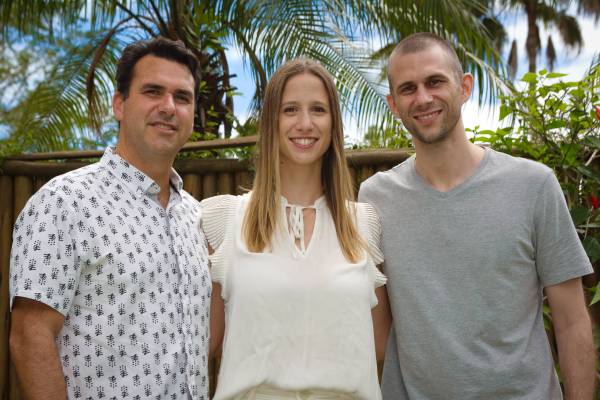a16z, NFX back Latitud’s effort to become ‘the operating system for every venture-backed company in LatAm’ – TechCrunch
Serial entrepreneur Brian Requarth learned his lesson the hard way.
When he sold Brazilian online real estate marketplace VivaReal for $550 million several years ago, he had to pay more than $100 million in capital gains taxes due to incorporation errors made early on. It was an expensive mistake, and one he wants to help Latin American entrepreneurs avoid with his new venture, Latitud.
“I took the advice from someone in Silicon Valley who told me ‘You need a C Corp…that’s what we invest in,’” Requarth told TechCrunch. “The reality was, and I came to learn this through a very costly mistake, was that I ended up paying $100 million in capital gains taxes to the U.S. government because it was a corporation in the U.S. even though we had zero activity there.”
The lesson stuck with him and it became somewhat of a personal mission to help warn others in the region not to do the same thing. Fast-forward to the beginning of the pandemic in 2020; Requarth teamed up with DuoLingo’s former VP of growth Gina Gotthilf and Yuri Danilchenko, former CTO of Brazilian startup Escale, to found what they describe as a “tech entrepreneurship program” in Latin America. The pandemic had just started, and while quarantining, the trio found themselves in the position — separately — of advising entrepreneurs who were trying to navigate the new normal amidst an increase in interest from global investors.
“Many called us worried and scared that funding was drying up while some had boards telling them to fire people,” Requarth recalls. “I ended up taking 150 Zoom calls in the summer of 2020 and heard countless stories of founders’ great ideas and amazing businesses. But I realized there was a huge gap in understanding basic stuff.”
And so Latitud was born. Today, the company — which is in the business of helping other startups get off the ground and funded in Latin American — is announcing its own funding round. Andreessen Horowitz (a16z) and NFX co-led Latitud’s $11.5 million seed funding round, which also included participation from Endeavor, Canary, FJ Labs, Ganas Ventures and unicorn founders such as Nubank’s David Vélez, Rappi’s Sebastian Mejia, Creditas COO Ann Williams, dLocal co-founder Sergio Fogel, Creditas founder Sergio Furio, Bitso founder Daniel Vogel, Auth0 co-founder Matias Woloski and Cornershop co-founder Daniel Undurraga, among others.
Bootstrapped until now, Latitud has been focused on execution and building community — which in LatAm, a region where people often value relationships as much as checks, goes a long way. It also wanted to make its thesis even more compelling when it did go to raise, noted Gotthilf.
“There’s been a massive growth of ambitious people growing businesses in the region but the infrastructure is a bit outdated,” said Requarth, who is Latitud’s CEO. “The ecosystem is being stress-tested and it’s all going to break if someone doesn’t build superhighways to make things more efficient and possible for tech entrepreneurship.”
Founders in the region often still depend on manual processes.
Also, with growing interest in the region coming from the U.S. — as evidenced by the lead investors of this financing — more people than ever are founding companies in Latin America. According to PitchBook, venture-backed companies raised $14.8 billion across 772 deals in Latin America in 2021 — more than the total capital invested in the region in the previous six years combined.
“If entrepreneurs in the U.S. are starting a venture-backed company, the friction is not there like in LatAm,” Requarth said. “It’s inexpensive to do things, it’s efficient.”
Latitud aims to help entrepreneurs from a startup’s early stages — with company formation, accessing cross-border capital, cap table management and access to advice from “accomplished” operators and tech leaders. It started by documenting the process to create Latitud.
“We discovered it cost about $30,000 to hire three different law firms to create the right structure so we can attract VC from the U.S.,” Requarth said. “It seems excessive, annoying and a waste of time.”
So the trio started mapping everything they were doing as they were starting Latitud, and building software to automate that process for LatAm entrepreneurs.
Today, the company is building a “suite” of software products, the first one being Latitud Go, which aims to allow any founder to “intelligently” incorporate a venture-backable company ready for global scale “at the click of a button and at a price five times less expensive than what exists in the market today.”
Dozens of companies are using that software today, and Latitud’s goal is to make it the system of record for every VC-backed company in LatAm.
It has also created an educational program and curriculum called Latitud Fellowships that is taught by accomplished operators at top tech companies around the world. Already, the program has attracted more than 800 entrepreneurs who have gone on to raise $250 million at a total valuation of over $1.5 billion collectively, Latitud boasts.
The company also has a venture arm, Latitud Ventures — led by Tomas Roggio — which has invested in more than 80 companies, including Pomelo, BHub and Alinea.
A16z General Partner Angela Strange has personally, and through her firm, been investing in LatAm for some time. She was drawn to Latitud’s ability to build “a valuable community of builders in Latin America” and its “unique and meaningful product offering that will accelerate time to market.”
NFX General Partner Pete Flint noted that he has known and worked with Requarth for over a decade, since he was an early investor and advisor in VivaReal.
“We’ve worked together on a number of projects since then,” Flint told TechCrunch. “I think this is going to be his greatest yet.”
It’s also notable that a16z and NFX both will benefit from getting very early access to up-and-coming stars in the LatAm region that they may not otherwise have had.
“There are huge opportunities in Latin America right now, but many great solutions will fail because of bureaucratic friction points,” said Nubank’s Vélez. “Latitud is building the infrastructure I wish I had when I started Nubank.”
The startup itself claims to not have an official headquarters. Gotthilf lives in São Paulo and Requarth is in the Bay Area (with plans to move to Mexico for a year). The rest of its 25-person team is spread across the U.S., Mexico, Colombia, Nicaragua, Uruguay, Panama, Argentina and Spain.
It plans to “aggressively hire” with its new capital.
“Our plan is to become a SaaS/fintech company,” Requarth said. “Our vision is to help an entrepreneur spin up a company, create a bank account and get all the essential tools they need to operate a business. We want to become the operating system for every venture-backed startup in LatAm.”
Meanwhile, Latitud is planning to hold an event April 5 “for anyone who wants to learn more and also have the opportunity to invest” in the startup.




